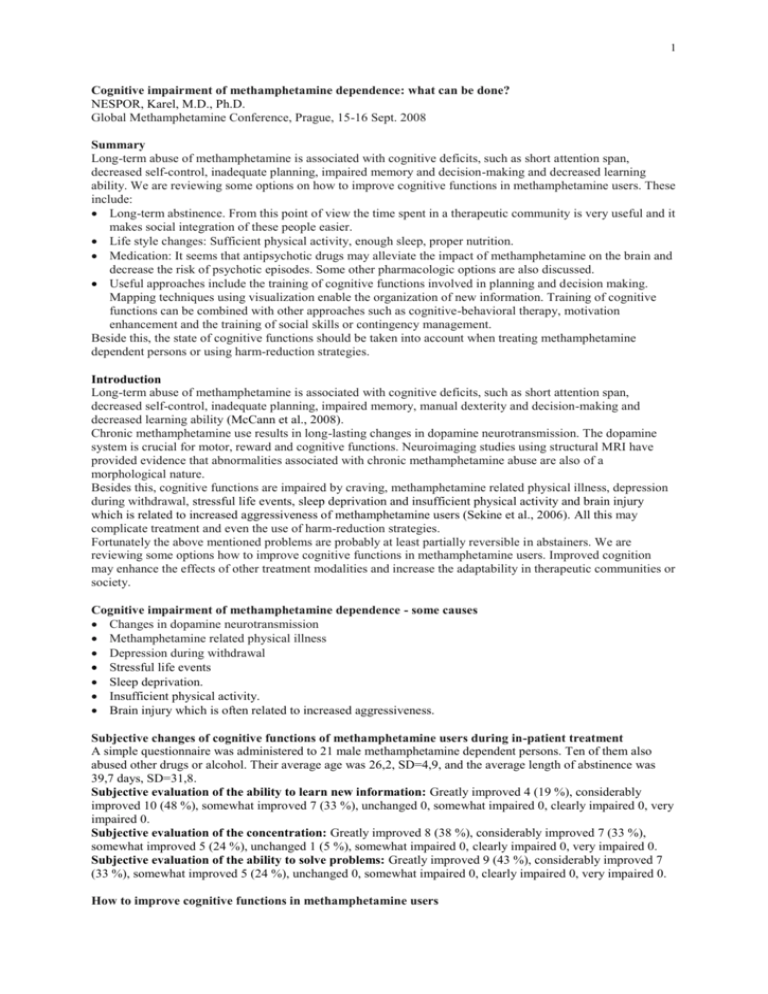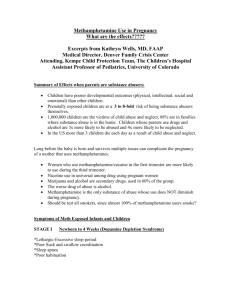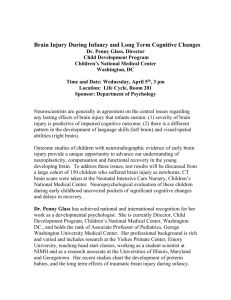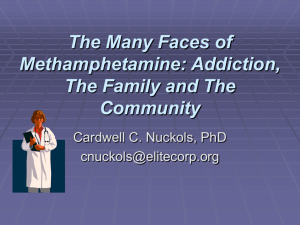Cognitive impairment of methamphetamine
advertisement

1 Cognitive impairment of methamphetamine dependence: what can be done? NESPOR, Karel, M.D., Ph.D. Global Methamphetamine Conference, Prague, 15-16 Sept. 2008 Summary Long-term abuse of methamphetamine is associated with cognitive deficits, such as short attention span, decreased self-control, inadequate planning, impaired memory and decision-making and decreased learning ability. We are reviewing some options on how to improve cognitive functions in methamphetamine users. These include: Long-term abstinence. From this point of view the time spent in a therapeutic community is very useful and it makes social integration of these people easier. Life style changes: Sufficient physical activity, enough sleep, proper nutrition. Medication: It seems that antipsychotic drugs may alleviate the impact of methamphetamine on the brain and decrease the risk of psychotic episodes. Some other pharmacologic options are also discussed. Useful approaches include the training of cognitive functions involved in planning and decision making. Mapping techniques using visualization enable the organization of new information. Training of cognitive functions can be combined with other approaches such as cognitive-behavioral therapy, motivation enhancement and the training of social skills or contingency management. Beside this, the state of cognitive functions should be taken into account when treating methamphetamine dependent persons or using harm-reduction strategies. Introduction Long-term abuse of methamphetamine is associated with cognitive deficits, such as short attention span, decreased self-control, inadequate planning, impaired memory, manual dexterity and decision-making and decreased learning ability (McCann et al., 2008). Chronic methamphetamine use results in long-lasting changes in dopamine neurotransmission. The dopamine system is crucial for motor, reward and cognitive functions. Neuroimaging studies using structural MRI have provided evidence that abnormalities associated with chronic methamphetamine abuse are also of a morphological nature. Besides this, cognitive functions are impaired by craving, methamphetamine related physical illness, depression during withdrawal, stressful life events, sleep deprivation and insufficient physical activity and brain injury which is related to increased aggressiveness of methamphetamine users (Sekine et al., 2006). All this may complicate treatment and even the use of harm-reduction strategies. Fortunately the above mentioned problems are probably at least partially reversible in abstainers. We are reviewing some options how to improve cognitive functions in methamphetamine users. Improved cognition may enhance the effects of other treatment modalities and increase the adaptability in therapeutic communities or society. Cognitive impairment of methamphetamine dependence - some causes Changes in dopamine neurotransmission Methamphetamine related physical illness Depression during withdrawal Stressful life events Sleep deprivation. Insufficient physical activity. Brain injury which is often related to increased aggressiveness. Subjective changes of cognitive functions of methamphetamine users during in-patient treatment A simple questionnaire was administered to 21 male methamphetamine dependent persons. Ten of them also abused other drugs or alcohol. Their average age was 26,2, SD=4,9, and the average length of abstinence was 39,7 days, SD=31,8. Subjective evaluation of the ability to learn new information: Greatly improved 4 (19 %), considerably improved 10 (48 %), somewhat improved 7 (33 %), unchanged 0, somewhat impaired 0, clearly impaired 0, very impaired 0. Subjective evaluation of the concentration: Greatly improved 8 (38 %), considerably improved 7 (33 %), somewhat improved 5 (24 %), unchanged 1 (5 %), somewhat impaired 0, clearly impaired 0, very impaired 0. Subjective evaluation of the ability to solve problems: Greatly improved 9 (43 %), considerably improved 7 (33 %), somewhat improved 5 (24 %), unchanged 0, somewhat impaired 0, clearly impaired 0, very impaired 0. How to improve cognitive functions in methamphetamine users 2 Abstinence, e.g. during treatment in a therapeutic community. Positive changes during abstinence are often surprising both for patients and their therapists. These improvements were verified by PET scans (Positron emission tomography, Schiffer et al., 2007). Sufficient physical activity improves depression and anxiety, and cognitive functions. (Nešpor and Csémy, 2006). Proper posture and breathing: Abdominal breathing is more effective than thoracic. Moreover, abdominal breathing enhances circulation and has a calming effect. To protect the brain from injury: This is why we recommend only comparatively safe kinds of physical activity such as walking, jogging, aerobic, yoga, qigong, swimming) and not e.g. boxing or football. Sufficient sleep: Sleep deprivation increases the risk of relapse and affects cognitive functions. Improving sleep, relaxation techniques, sleep hygiene and cognitive-behavioral approaches are recommended. Relaxation techniques: Relaxation techniques alleviate anxiety, depression, pain and stress. Besides this, learning how to relax trains cognitive functions (Nešpor, 1998). Proper nutrition: Many methamphetamine users suffer from malnutrition. For the sake of interest we mention some food which may enhance cognitive functions: Green tea (Kuriyama et al., 2006, but caffeine may cause craving in stimulant dependent persons), curcuma (Ng et al., 2006), celery, apples and other fruits including some berries. Omega-3 fatty acids are also important. They are found is fish, flax seed, avocado, pumpkin seed and some not unroasted nuts, as well as legume. A diet high in fiber is recommended. A proper breakfast increases mental performance before midday. Conversely it is advantageous to decrease chemical additives, refined sugar and saturated fats. Chemical additives may worsen attention deficit hyperactivity disorder (ADHD) in children, and it is better to avoid these additives in adults with similar problems. Training of cognitive functions is useful (Czuchry a Dansereau, 2003). It take place e.g. during learning or while keeping a diary. Mental maps are also useful in this respect. Picture 1. An example of a simple mental map Reasonable demands Professional help Self-help Physical exercise ABSTINENCE Safe social network Rest and relaxation Healthy life-style Better relationships Safe leisure time hobbies Sufficient sleep Music: Listening to Mozart’s sonatas improves the cognitive performance, even in animals (Aoun et al., 2005). Music also improves cognitive functions in people after cerebral artery stroke (Särkämö et al., 2008). Playing an instrument or singing is also advisable. Prevention of excessive stress through life-style adjustment, relaxation and compensation for the one-sided strain during work. Depression persisting for a long time during abstinence should be adequately treated. On the other hand antidepressant drugs have little effect on short-term problems at the beginning of abstinence or methamphetamine dependence as such. Psychopharmacology options: The effect of donepezil in this population has not been tested so far. Many other options were used but the results were negative or inconclusive. This makes the non-pharmacological approaches even more important. How to improve cognitive functions in methamphetamine users Abstinence Sufficient physical activity Proper posture and breathing Protect the brain from injury Relaxation techniques Proper nutrition Music Prevention of excessive stress Treatment of depression, if it persist beyond withdrawal. References Aoun P, Jones T, Shaw GL, Bodner M. Long-term enhancement of maze learning in mice via a generalized Mozart effect. Neurol Res. 2005;27(8):791-6. 3 Czuchry M, Dansereau DF. Cognitive skills training: impact on drug abuse counseling and readiness for treatment. Am J Drug Alcohol Abuse. 2003;29(1):1-18. McCann UD, Kuwabara H, Kumar A, Palermo M, Abbey R, Brasic J, Ye W, Alexander M, Dannals RF, Wong DF, Ricaurte GA. Persistent cognitive and dopamine transporter deficits in abstinent methamphetamine users. Synapse. 2008;62(2):91-100. Kuriyama S, Hozawa A, Ohmori K et al. Green tea consumption and cognitive function: a cross-sectional study from the Tsurugaya Project. Am J Clin Nutr 2006;83:355–361. Nešpor K. Uvolněně a s přehledem. Relaxace a meditace pro moderního člověka. Praha. Grada 1998; 96. Nešpor K, Csémy, L. Psychotropní účinky tělesné aktivity. Praktický lékař 2006, 86(11):672. Ng TP, Chiam PC, Lee T, Chua HC, Lim L, Kua EH. Curry consumption and cognitive function in the elderly. Am J Epidemiol. 2006;164(9):898-906. Särkämö T, Tervaniemi M, Laitinen S, Forsblom A, Soinila S, Mikkonen M, Autti T, Silvennoinen HM, Erkkilä J, Laine M, Peretz I, Hietanen M. Music listening enhances cognitive recovery and mood after middle cerebral artery stroke. Brain. 2008;131(Pt 3):866-76. Schiffer WK, Liebling CN, Patel V, Dewey SL. Targeting the treatment of drug abuse with molecular imaging. Nucl Med Biol. 2007;34(7):833-47. Sekine Y, Ouchi Y, Takei N, Yoshikawa E, Nakamura K, Futatsubashi M, Okada H, Minabe Y, Suzuki K, Iwata Y, Tsuchiya KJ, Tsukada H, Iyo M, Mori N. Brain serotonin transporter density and aggression in abstinent methamphetamine abusers. Arch Gen Psychiatry. 2006;63(1):90-100. Dr. Nespor www.drnespor.eu www.youtube.com/drnespor






